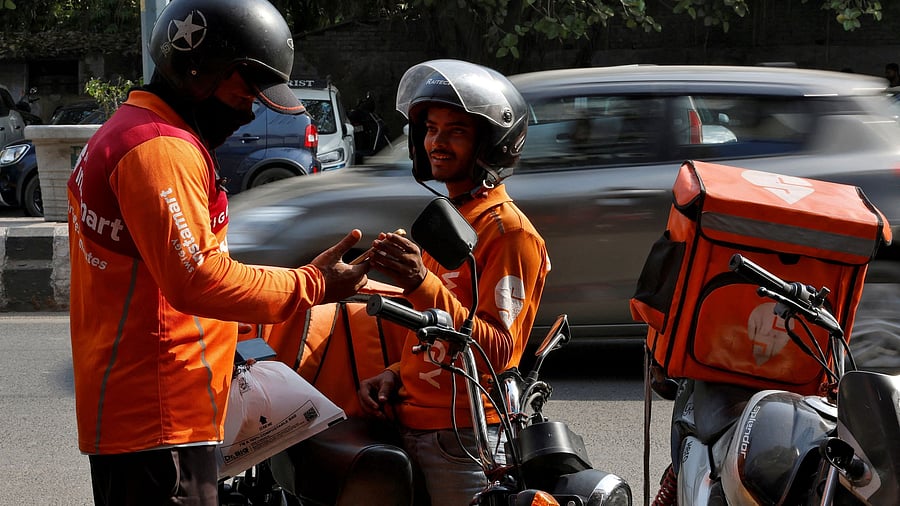
Gig workers prepare to deliver orders outside Swiggy's grocery warehouse at a market area in New Delhi
A Niti Aayog report in 2020-21 said there were almost 7.7 million gig workers in India, which is estimated to reach around 23.5 million by 2029-2030. The steep rise in the workforce has led to many concerns surrounding the employment status of these workers.
After 2007, app-based delivery models saw a major boom in the country, which led to a huge growth in the gig economy as well as the number of gig workers. Gig employment is currently unregulated. All labour laws have threshold criteria that must be met for workers to fall under their purview. An employer-employee relationship must exist for the application of labour codes. The factory served as the paradigm for this idea as it developed in the 20th century.
Recently, there has been a paradigm shift in the employer-employee relationship with an increase in the gig workforce. Gig work embodies all the characteristics of institutionalised power differentials and subordination that justify the importance of labour laws in the first place, yet it differs significantly from the employment relationship between a factory owner and its employees. The app, which the platform uses to control who can and cannot access work, is at the centre of the interaction between the platform provider and the employee.
Gig workers have been protesting and agitating in India over several issues, including income sharing, working hours and other terms and conditions of employment. In the gig economy, employment relations are, at worst, non-existent or extremely complex, making it challenging to resolve these concerns within the current legal system.
Currently, there is no central law that aims to regulate gig workers; the code on social security only defines who is a gig worker. Rajasthan and Karnataka have taken steps to frame laws to protect the interests of gig workers. However, there are severe issues with the legislation. It fails to define the problem of characterising working relationships in the gig workforce. It refers to app firms as aggregators instead of employers. Protective labour regulations that guarantee minimum wages, workplace health and safety, work schedules and leave policies, and the ability to engage in collective bargaining cannot be implemented in the absence of employment relation recognition. These significant problems with gig employment remain unaddressed.
In 2021, the United Kingdom Supreme Court ruled that Uber acts as an employer and the drivers are employees of the company, thus they come under the scope of existing labour laws in the UK. On similar grounds, legislation in India should take a step to define this relationship. Legislators and courts across the globe are rejecting gig businesses’ flimsy claims that their employees are partners with whom they have an equal contract. Courts have acknowledged that gig workers require labour law protection just as much as employees in the more traditional or classical sense. Though gig workers exercise extensive control over their employers in all relevant aspects and can switch employers within the same overall work context, it does not truly classify them as independent contractors.
Due to the absence of formal protocols to safeguard them, female drivers face inappropriate sexual remarks and actions from patrons as part of their employment. To mitigate harassment, female employees have admitted to being pickier about when and where they work. This cautious approach inadvertently affects their earning potential, and by avoiding certain shifts (such as weekends or late hours), women miss out on lucrative opportunities.
According to the POSH Act — or Sexual Harassment of Women at Workplace (Prevention, Prohibition, and Redressal) Act — any woman who has experienced sexual harassment, regardless of her age or employment status, qualifies as an aggrieved woman. Nonetheless, the notion of a workplace does not explicitly encompass the dynamic work environment experienced by women who operate as beauticians or cab drivers. Despite firms hiring them falling under its purview, the lack of clarity on employer-employee relationships leaves gig workers outside the scope of the POSH Act.
The challenges faced by gig workers have drawn attention for quite some time, yet they have been sidelined by governments. As states take measures to protect the interests of these workers, it’s crucial not to overlook issues such as fair wages, harassment prevention and reasonable working hours. To start with, the government needs to put gig workers under the scope of employees, which itself will extend an umbrella of protections.
(The writer is a legal researcher based out of Delhi)